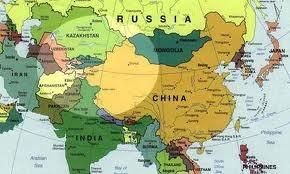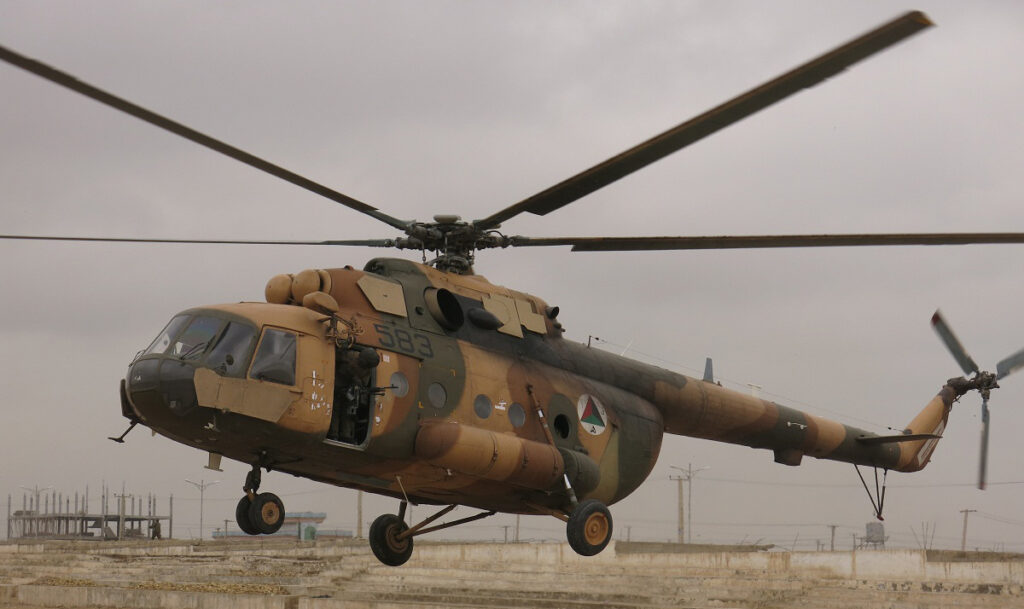BISHKEK (TCA) — The Publisher’s note: Throughout the 19th and 20th centuries, Central Asia was the scene of intense geopolitical struggle and the Great Game between the British and Russian Empires, and later between the Soviet Union and the West, over Afghanistan and neighboring territories. Into the 21st century, Central Asia has become the area of a renewed geopolitical interest, dubbed the New Great Game, largely based on the region’s hydrocarbon and mineral wealth. On top of that, the region now is perhaps the most important node in the implementation of China’s One Belt, One Road initiative through which Beijing aims to get direct access to Western markets. Every week thousands of news appears in the world’s printed and online media and many of them may escape the attention of busy readers. At The Times of Central Asia, we strongly believe that more information can better contribute to peaceful development and better knowledge of this unique region. So we are presenting this Weekly Digest which compiles what other media have reported on Central Asia over the past week.
KAZAKHSTAN
Kazakhstan and the struggle over Central Asia
Kazakhstan, an emerging regional player, is caught between two superpowers — Russia and China
June 4 — “As the war in Afghanistan continues to disappear from the media, Central Asia once more becomes a black hole for news coverage. Sparsely populated and far-removed from the oceanic arteries of global commerce, it seems a region ripe for forgetting, once the Taliban are out of the headlines. But that would be a strategic mistake.” READ MORE: https://spectator.us/kazakhstan-struggle-central-asia/
What Is Nazarbayev’s Legacy in Kazakhstan?
Kazakhstan’s first president resigned, but he remains fundamentally intertwined with the state
June 5 — “The black Mercedes in which Nursultan Nazarbayev, Kazakhstan’s first president, once rode through his native village of Shamalgan in 2001 is now in a glass case welcoming visitors. Streets, universities, airports, funds, and prizes have been renamed after Nazarbayev for years, but since his surprising resignation in March, there has been a renaming spree across the country, starting with the renaming of the capital to Nur-Sultan.” READ MORE: https://thediplomat.com/2019/06/what-is-nazarbayevs-legacy-in-kazakhstan/
The Kazakhstan elections and the transition that wasn’t
In March, Kazakhstan’s long-term leader stepped down, making way for a “transition” of power. But everything about this change has been carefully orchestrated and highly controlled
June 5 — “On 9 June, for the first time since independence in 1991, Kazakhstan will elect a present who is not Nursultan Nazarbayev. Nazarbayev, who was Kazakhstan’s leader for 30 years, voluntarily stepped down in March, saying it was time for a new generation of leaders. The handover of power has been relatively smooth so far – the senate leader, Qasym-Jomart Tokayev, was appointed interim president in accordance with the constitution.” READ MORE: https://www.opendemocracy.net/en/odr/the-kazakhstan-elections-and-the-transition-that-wasnt/
Kazakhstan election: Rare protests in a country that bans dissent
Nazarbayev’s resignation sparked hopes for change, but many Kazakhs quickly became disillusioned
June 7 — “Kazakhstan elects a new president on Sunday. For the first time since independence, long-serving Soviet-era leader Nursultan Nazarbayev is not among the candidates. This has inspired rare calls for change – and a crackdown on protests. The power transfer has been planned “for more than three years”, according to Mr Nazarbayev. And so far, the transition has been tightly managed.” READ MORE: https://www.bbc.com/news/world-asia-48545166
KYRGYZSTAN
Can You Find Kyrgyzstan on a Map? Now Might Be The Time
While Kyrgyzstan remains for now a little known hiking destination, that is changing quickly
June 1 — “Of course, there is no shortage of places to go hiking in the world (at least for now). The AT, PCT, and CDT are more than most people can get to in a lifetime, but it never hurt to add another dream hike to the adventure bucket list, and Kyrgyzstan, a small country where about 90% of landscape dominated by the Tian Shan and Pamir mountain ranges is more than 4,900 ft above sea level, certainly deserves a spot on that list.” READ MORE: https://thetrek.co/can-find-kyrgyzstan-map-now-might-time/
Harsh conditions for Askarov, the Kyrgyz journalist UN says should be freed
The U.N. Human Rights Committee ruled in 2016 that Azimjon Askarov was subject to torture and mistreatment from the moment of his detention on June 15, 2010 to his speedy trial and subsequent imprisonment, and that he should be released immediately
June 3 — “On a recent morning in Bazar-Korgon, southern Kyrgyzstan, Khadicha Askarova was giving hasty instructions to her daughter about what needed to be packed. They were about to set off: first for the capital Bishkek, some 600km from where they live, and then another 70km to a prison colony where her husband, Azimjon Askarov, was transferred in March.” READ MORE: https://cpj.org/blog/2019/06/kyrgyzstan-azimjon-askarov-jailed-harassed-mistreated.php
India’s Military Loan to Kyrgyzstan: An Issue of Mutual Benefit
By expanding cooperation with Kyrgyzstan, India probably sees an opportunity to insert itself into Central Asia and to counter China’s rapidly-increasing influence in that region
June 5 — “Kyrgyzstani President Sooronbay Jeenbekov was a special guest at Indian Prime Minister Narendra Modi’s swearing-in to office for his second term. The invitation given to Mr Jeenbekov is just one sign of the growing ties between the two countries. Where previously the relationship was limited to cultural exchanges and the like, Mr Modi signed an agreement with then-President Almazbek Atambayev on defence co-operation and the holding of annual joint military exercises.” READ MORE: http://www.futuredirections.org.au/publication/indias-military-loan-to-kyrgyzstan-an-issue-of-mutual-benefit/
TAJIKISTAN
EU gives Tajikistan pass on suppressing human rights
During his visit to Tajikistan, the president of the European Council did not address any of the multiple instances in which President Rahmon’s regime has in recent years presided over an intense and often violent repression of basic rights
May 31 — “The president of the European Council kicked off his tour to Central Asia in Tajikistan by glossing over the rapid shrinking of that country’s fundamental freedoms and shutting out queries from reporters. In his only public statement while in the country, Donald Tusk showered Tajik President Emomali Rahmon with praise and expressed certainty that his leadership would ensure a bright future for civil liberties.” READ MORE: https://eurasianet.org/eu-gives-tajikistan-pass-on-suppressing-human-rights
Frost thawing between Tajikistan and Iran?
In its Middle East politics, Tajikistan is maneuvering between two arch-rivals — Saudi Arabia and Iran
June 5 — “Is Tajikistan about to have another strategic change of heart? On June 1, the Organization for Islamic Cooperation held a summit of foreign ministers from its member states in the Saudi city of Jeddah. Although the conference was scheduled long in advance, Tajikistan’s foreign minister snubbed the event, sending his deputy in his place. Instead, Sirodjidin Muhriddin preferred to pay a visit to the sworn enemy of Saudi Arabia — Iran.” READ MORE: https://eurasianet.org/frost-thawing-between-tajikistan-and-iran
UN Group Calls On Tajik Government To Release Imprisoned Rights Lawyer
The Washington-based organization Freedom Now released a statement on June 3 noting that the UN Working Group on Arbitrary Detention had found Tajikistan’s actions against lawyer Buzurgmehr Yorov to be in violation of international law
June 6 — “A UN agency is calling on authorities in Tajikistan to free lawyer Buzurgmehr Yorov from prison, saying Yorov’s rights have been consistently violated since the moment of his detention. Yorov was one of the very few lawyers in Tajikistan willing to defend people the Tajik government considered opponents. Yorov was also a vocal critic of rights abuses.” READ MORE: https://www.rferl.org/a/un-group-calls-on-tajik-government-to-release-imprisoned-rights-lawyer/29985133.html
TURKMENISTAN
Will the last person leaving Turkmenistan turn out the lights?
In its ‘Akhal-Teke: A Turkmenistan Bulletin’, Eurasianet reviews the main news and events in the Central Asian country for the previous week
June 4 — “Turkmenistan sought another perch in the Guinness Book of World Records this week by arranging what it hopes was the longest-ever single file of bicycle riders. The stunt was organized to mark World Cycling Day on June 3, which has become an all-consuming obsession for President Gurbanguly Berdymukhamedov. Last year, he corralled around 3,246 people into riding their bikes to set what was the described as a record-setting cycling lesson.” READ MORE: https://eurasianet.org/will-the-last-person-leaving-turkmenistan-turn-out-the-lights
Four more Turkmenistan’s study-abroad students who came home for holidays drafted into the army
The Turkmen army is experiencing an acute shortage of both commissioned officers and conscripts
June 5 — “Four more study-abroad students, who arrived in Turkmenistan to spend their summer holidays, were drafted into the army from the airport. Correspondents of “Chronicles of Turkmenistan” report that they arrived from Turkey in the night of 1 June. Two young men are natives of Bairamaly whereas two others come from Lebap velayat. Their parents were scheduled to pick them up at the Ashgabat airport but failed to see them.” READ MORE: https://en.hronikatm.com/2019/06/four-more-turkmenistans-study-abroad-students-who-came-home-for-holidays-frafted-into-the-army/
Turkmen president: Turkmenistan’s geostrategic role is growing
Ashgabat considers it a priority to develop the North-South and East-West transport corridors, increase the capabilities of the Central Asia-Persian Gulf communication network and develop transport links in the Caspian-Black Sea region
June 7 — “Today, the geostrategic role of Turkmenistan on the Eurasian continent as an important intersection of transit and transport corridors is growing, Trend reports referring to the local Altyn Asyr TV channel, which in turn quotes President Gurbanguly Berdimuhamedov. Special attention should be paid to observing the order of the movement of goods and vehicles across the customs borders of the country, as was stressed by the head of state at a meeting of the State Security Council of Turkmenistan, instructing to keep the conduct of relevant procedures under proper control and in accordance with the requirements of international standards, according to the report.” READ MORE: https://en.trend.az/casia/turkmenistan/3073129.html
UZBEKISTAN
Privatization in Uzbekistan: new investment opportunities
Uzbekistan is taking new steps to attract foreign investment in its economy
June 3 — “The Resolution of the President of the Republic of Uzbekistan No. 4300 “On further measures for the improvement of the mechanisms for attracting foreign direct investment to the economy of the Republic of Uzbekistan” (the Resolution) shows the strong intention of the government to liberalize the economy and boost its effectiveness by selling its shares in domestic companies.” READ MORE: https://www.jdsupra.com/legalnews/privatization-in-uzbekistan-new-69000/
Uzbekistan: A Small Dose of Media Freedom
Previously-banned websites are unblocked in Uzbekistan, but experts still urge caution
June 6 — “Analysts remain sceptical over the true extent of Uzbekistan’s movement on press freedom, despite apparent moves to liberalise the media environment. Since President Shavkat Mirziyoyev replaced his authoritarian predecessor Islam Karimov in December 2016, he has instituted a number of strategic reforms that appear to signal an intention to open up what was one of the world’s most isolated states. Most recently, in early May, Uzbekistan restored access to a swathe of previously banned foreign outlets. These included Voice of America, Amerika ovozi, BBC Uzbek, Deutsche Welle, Amnesty International, Human Rights Watch, Eurasianet.org and Uzmetronom.” READ MORE: https://iwpr.net/global-voices/uzbekistan-small-dose-media-freedom
Architects behind redevelopment of Forest’s City Ground tasked with creating new capital city in Uzbekistan
The proposal has been developed to accommodate a population of roughly two million people in Tashkent. It will be a twin to the current capital with the aim of revitalising the “Old City”
June 6 — “The Nottinghamshire firm behind a multi-million pound redevelopment of Forest’s City Ground has unveiled its masterplan for a new twin capital city in Uzbekistan. Architecture group Benoy, which is headquartered in Newark, has been tasked with transforming 49,400 acres of land to the east of Tashkent to include a new government district, business area, airport and trade district. The company, which was the masterplanner behind Yas Island, now the home of the Abu Dhabi Grand Prix, partnered with the Mayor of Tashkent to develop the proposal.” READ MORE: https://www.nottinghampost.com/news/nottingham-news/architects-behind-redevelopment-forests-city-2944639
AFGHANISTAN
After Centuries Of Neglect, Afghanistan’s Historic Minaret Under Threat From Taliban
The Minaret of Jam, a UNESCO World Heritage Site, dates back to 1190. It remains in danger, this time from the Taliban, the fundamentalist group that has destroyed the country’s archaeological relics in the past
June 1 — “Centuries of neglect and frequent floods are threatening the Minaret of Jam, one of Afghanistan’s archaeological treasures. Last week, the 800-year-old structure in the remote, western province of Ghor was left on the verge of collapse after a flood triggered by torrential rains. Muddy floodwaters inundated the archaeological site and smashed against the base of the minaret.” READ MORE: https://www.rferl.org/a/afghanistan-historic-jam-minaret-threat-taliban-floods-neglect/29976180.html
Winning in Afghanistan Requires Taking the Fight to Pakistan
The stability of Afghanistan—and the denial of its territory to terrorist groups—requires a good-faith Pakistani agreement to cease backing extremists, and after nearly two decades, this means, coercing Pakistan
June 3 — “U.S. Special Envoy for Afghanistan Zalmay Khalilzad was in Washington, DC last week to brief Capitol Hill on his ongoing talks with the Taliban. The senators were unimpressed, and with reason. There any many flaws in Khalilzad’s plan: It revives the pre-9/11 formula of legitimizing Taliban rule in exchange for a Taliban pledge to close terror camps; it undercuts the legitimacy of the elected Afghan government; and it discounts the Taliban’s long history of insincere diplomacy and fleeting commitments. The biggest problem with Khalilzad’s approach, however, is it ignores a simple fact: There can be no peace in Afghanistan so long as Pakistan chooses to undercut Afghan stability and support extremism. The missing piece to the Khalilzad strategy, therefore, is how to bring Pakistan to heel.” READ MORE: https://nationalinterest.org/feature/winning-afghanistan-requires-taking-fight-pakistan-60332
I Met the Taliban. Women Were the First to Speak
The Taliban acknowledged that women will be able to study and work
June 4 — “Afghanistan remains the worst place in the world to be a woman, and the continuation of war makes it additionally difficult for Afghan women to live full, secure lives. Kabul has recently witnessed a new wave of shootings of women, including the murder of a prominent Afghan journalist by her husband’s family.” READ MORE: https://www.nytimes.com/2019/06/04/opinion/afghanistan-taliban-peace-talks.html
TALKING TO THE TALIBAN WITH THE WRONG ASSUMPTIONS: THE CONUNDRUM OF AFGHAN PEACE
After 18 years of fighting in Afghanistan, the United States is diving into a peace process based on false assumptions about its primary adversary, the Afghan Taliban, the director general of Afghanistan Civil Service Institute writes in a commentary
June 5 — “In his 1995 memoir In Retrospect: The Tragedy and Lessons of Vietnam, former U.S. Secretary of Defense Robert McNamara boiled down the American failure in Vietnam to one important factor: America’s inability to fully grasp the complexity of its adversaries and the environment in which they operated. He wrote: “[t]he basic lesson is: understand your opponent…[w]e don’t understand the Bosnians, we don’t understand the Chinese and we don’t really understand the Iranians.” Little has changed in the quarter-century since McNamara’s reflection.” READ MORE: https://warontherocks.com/2019/06/talking-to-the-taliban-with-the-wrong-assumptions-the-conundrum-of-afghan-peace/
WORLD
On the ‘New Silk Road,’ a Father-Son Road Trip Goes 8,000 Miles to China and Back
China joined the Transport Internationaux Routiers, a global transport convention, in May 2018, and its ambitious “Belt and Road Initiative” has built a network of fresh highways and transit links through Central Asia—routes that could bring Europe and China closer than ever before
June 2 — “As far as road trips with your dad go, this one was unusual, even for Siebe Alblas. First, there was the distance: more than 4,000 miles one way, from Rotterdam in the Netherlands to western China, via Berlin, Moscow and much of Kazakhstan. Then, there was the pace: more than 80 hours of driving—nearly as long as it would take to drive from New York to Los Angeles and back—over less than six days, with father and son switching off when the other was tired.” READ MORE: http://fortune.com/2019/06/02/china-to-europe-route-belt-and-road/
The EU’s new Central Asia strategy: What does it mean for trade?
The economic and trade relations between the European Union and Central Asia countries have a big, unused potential that needs to be fully used for the benefit of both parties
June 5 — “Trade between Central Asia and Europe has increased modestly since 2007, when the European Union launched its first strategy for the five post-Soviet republics. From 2007 to 2018, turnover grew from $31.5 billion to $36.5 billion, according to IMF data.” READ MORE: https://eurasianet.org/the-eus-new-central-asia-strategy-what-does-it-mean-for-trade









